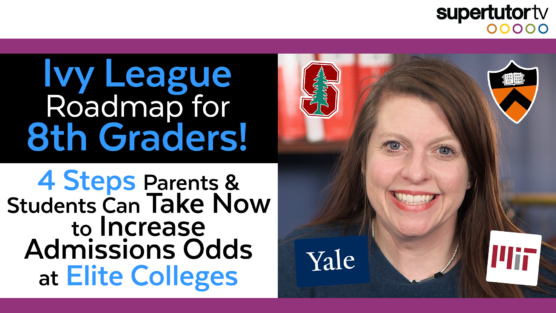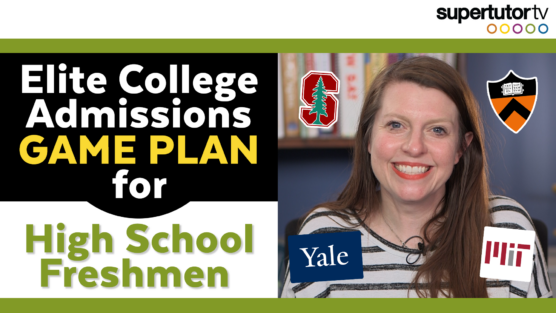Do you want to get into a top-ranked university in the United States, or maybe you want your kid to, or maybe you’re just curious about what it takes to get in? In this blog, I’m going to share 10 of my top tips for how to get into a top 10 ranked college or university.
Don’t believe that just because you’re the bee’s knees at your high school and you have the perfect GPA and maybe even the perfect SAT score, you’re going to get into a lot of these amazing schools that you’re applying to. 44% of U.S. students have an A average; there are around 4 million seniors in high school. So if we do the math, that’s about 1.76 million kids with an A average. Around 200,000 seniors are going to be in the top 5% of their school. Approximately 16,981 of those will attend an Ivy League university. And 6,750 will attend Harvard, Stanford, Princeton, or Yale. Think about those numbers. 200,000 versus less than 20,000. And if you’re getting really rarefied, we’re looking at around 7,000. You do not have a 50/50 shot at admission to any of these places. These 5% average rates are real, and maybe they will become 10% if everything is perfect, but they certainly are not 50%.
Tip number two is very specific. To me, UChicago is your best bet if you want to get into a top 10 college. But here’s the rule: you have to apply ED, and ideally ED 1. Yes, you’ve got to sacrifice the opportunity to go to other places if you want to get the most bang for your buck at the easiest school to get into. And what do I mean by easy? By easy, I mean that you don’t have to be 100% perfect. I’ve seen a student get in there with five Bs on his transcript—maybe even six—but if you have five Bs or something like that, you need to have amazing essays. They have weird, quirky essay topics, but you do not have to cure cancer; you just have to have a good story. So, if you can tell a good story and you apply ED, UChicago is on the list.
Tip number three: if you are an international student, please do not set your hopes on MIT. MIT publicly discloses that their admission rate for international students is preponderously low and that they favor American students in the admission process because of their need-blind/meets 100% of demonstrated need policy. So that means that they have amazing financial aid if you can get in, but in order to provide that financial aid to as many students as possible, they prefer American students to international ones. If you’re international and you want to get a degree from MIT, look at grad school because they admit tons of grad students.
Tip number four: make sure your voice is in your essays. Make sure it doesn’t sound like your mom or your English teacher wrote it. Also, if you’re an international student, your English isn’t that good, and you get help on your essays, people are going to find out when they see your activities section and it’s not proofread while your essays are totally perfect and sound like someone else wrote them. Inconsistency in voice is a total death knell for your elite application. If your English is that bad, though, you probably shouldn’t be going to a top 10 university.
Tip number five: if you’re trying to go to Harvard, Yale, Stanford, Princeton, or MIT, I usually see students get in if they either have a wow factor—meaning they’re the best in their world at something, like being the top flute player from the state of Mississippi, curing cancer, going to the Olympics, etc.—or they are fulfilling what I call institutional goals. What are institutional goals? In short, that’s being a legacy or being from an underrepresented minority or demographic. It can also be interests. So, if you play the oboe and they need an oboe player for their orchestra, they might let you in. If you want to major in Russian literature, they have a really good Russian Literature Department, and they need to fill those tenured professors’ classes, then you may have a better chance of getting in. Occasionally, I do see very strong students get into these colleges as well. Meaning that they’re captain of the debate team, captain of the student council, or really stand out but do more typical activities. And these students only typically get in if they have amazingly strong essays, amazing teacher recommendations, and usually come from what I call a strong pedigree, meaning they go to a feeder school or one of these high schools that’s super academically qualified with a good reputation. But generally, like I said previously, they want to see a wow factor or institutional goals. That’s what gets you into top colleges. So don’t take it personally. It’s not that you’re not awesome. It’s just that there are only so many spots, and they don’t want a billion computer science majors.
Okay, my next point is that overrepresented groups are always going to struggle more with admission. So my quick tip is to not disclose that you’re part of an overrepresented interest group if you don’t have to. What are overrepresented interest areas? Pre-med, CS, some engineering, or if you’re applying to Penn, it would be trying to get into the business school or trying to get into Wharton. In terms of background, it would be something like you’re Asian American. International students, you can’t really hide because you have to put the country where you’re from, but that’s going to make it harder for you to get in, especially if you’re from Asia. If you’re from an underrepresented country, you’ve probably got a leg up.
Number seven: ED matters quite a bit, especially at anything that’s not HYPS or MIT. Harvard, Yale, Stanford, Princeton, and MIT are really hard schools to get into. If you really want to play the game and increase your odds of getting into a top school, your best bet is not to try to aim for one of those first. Aim for something else first, and you’re really going to increase your odds of getting in.
Number eight: test scores. I know we live in a test-optional world. But trust me, a great test score is going to help you get into a top college. Applying without a test score will hurt you in most cases. If you have a super awesome wow factor, can you get in without a test score? Yes, you can. But again, a test score is going to help you if it’s good. So take the test—the SAT or the ACT. I know they’re not fun, but take them.
Number nine: essays matter more than ever. And no, ChatGPT is not going to write an essay that gets you into Harvard. I did a whole video on that, and you can go check it out. Here’s the deal: ChatGPT can proofread wonderfully, but it is not a good storyteller. So don’t expect it to figure out what your narrative that’s going to get you in is.
Number ten: standing out matters. And what I mean by this is that when you’re making choices, oftentimes, making the choice to do something different or original is going to be the better choice than doing something that you just have to sign up for on a list and that 20 other people from your high school are doing. In order to stand out, you have to be different, and sometimes just being quirky or different, even if it’s not more excellent in any way, can help you stand out. So, for example, I’d rather work with a student who builds a ramen-making robot than somebody who just goes to VEX robotics competitions. Because at least the kid making a ramen-making robot has a little bit of a quirk factor and can write a more entertaining story. So, look for ways to stand out and be original.
And there you go. I have lots more videos on my channel about what kinds of things these colleges buy into and what matters, so make sure to check those out for more information. I hope you learned something from this, and take care!




